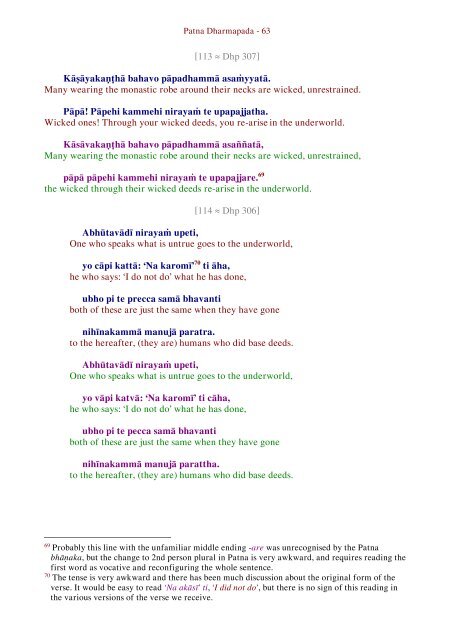Patna Dhammapada, Patna Dhamma Verses
A text and translation of the collection of the Dhammapada verses maintained in Patna, India, together with parallels.
A text and translation of the collection of the Dhammapada verses maintained in Patna, India, together with parallels.
- TAGS
- dharma
- dhamma
- dhammapada
Create successful ePaper yourself
Turn your PDF publications into a flip-book with our unique Google optimized e-Paper software.
<strong>Patna</strong> Dharmapada - 63<br />
[113 ≈ Dhp 307]<br />
Kāṣāyakaṇṭhā bahavo pāpadhammā asaṁyyatā.<br />
Many wearing the monastic robe around their necks are wicked, unrestrained.<br />
Pāpā! Pāpehi kammehi nirayaṁ te upapajjatha.<br />
Wicked ones! Through your wicked deeds, you re-arise in the underworld.<br />
Kāsāvakaṇṭhā bahavo pāpadhammā asaññatā,<br />
Many wearing the monastic robe around their necks are wicked, unrestrained,<br />
pāpā pāpehi kammehi nirayaṁ te upapajjare. 69<br />
the wicked through their wicked deeds re-arise in the underworld.<br />
[114 ≈ Dhp 306]<br />
Abhūtavādī nirayaṁ upeti,<br />
One who speaks what is untrue goes to the underworld,<br />
yo cāpi kattā: ‘Na karomī’ 70 ti āha,<br />
he who says: ‘I do not do’ what he has done,<br />
ubho pi te precca samā bhavanti<br />
both of these are just the same when they have gone<br />
nihīnakammā manujā paratra.<br />
to the hereafter, (they are) humans who did base deeds.<br />
Abhūtavādī nirayaṁ upeti,<br />
One who speaks what is untrue goes to the underworld,<br />
yo vāpi katvā: ‘Na karomī’ ti cāha,<br />
he who says: ‘I do not do’ what he has done,<br />
ubho pi te pecca samā bhavanti<br />
both of these are just the same when they have gone<br />
nihīnakammā manujā parattha.<br />
to the hereafter, (they are) humans who did base deeds.<br />
69<br />
Probably this line with the unfamiliar middle ending -are was unrecognised by the <strong>Patna</strong><br />
bhāṇaka, but the change to 2nd person plural in <strong>Patna</strong> is very awkward, and requires reading the<br />
first word as vocative and reconfiguring the whole sentence.<br />
70<br />
The tense is very awkward and there has been much discussion about the original form of the<br />
verse. It would be easy to read ‘Na akāsī’ ti, ‘I did not do’, but there is no sign of this reading in<br />
the various versions of the verse we receive.


















